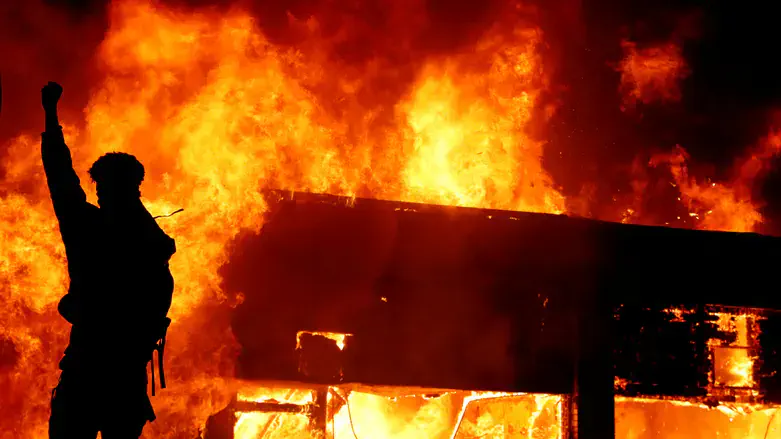
Readers of my columns know that I never hesitate to denounce the ill-will toward Israel and the open antisemitism rampant in the world today. At the same time, I don’t shy away from pointing out what I believe Israel and the Jewish world could do differently or better to strengthen their position and good name. In this column, I’ll highlight some points to help readers understand why many otherwise pleasant, intelligent, and well-educated Gentiles now condone and justify actions that even the most progressive Jews find shocking.
While there is undeniable truth in the Rabbinic dictum that Esav hates Yaakov (Esav refers to the Christian world and although not mentioned in the same saying, Ramban explains why that is true of Ishmael as well and Psalm 83 includes the Ishmaelites in listing Israel's enemies), it is unwise to deduce that Jews can do little or nothing to mitigate antisemitism. The success and accomplishments of Israel and the Jewish people make antisemitism impossible to eliminate entirely—envy and resentment will always find a foothold among some.
However, antisemitism can be marginalized and kept under control, provided envy and resentment are also marginalized from academic, cultural, and political life. Ironically, many well-meaning but misguided Jews have unintentionally helped legitimize and fuel envy and resentment, even in the Middle East, where such attitudes have tragic consequences for millions of Jews.
Mainstream Jewish America has cultivated the false belief that conservative white Christians pose an existential threat to their lives and rights. Yet, since October 7th, it is precisely these conservative white Christians who have consistently stood with Israel and American Jews. This is clear to anyone grounded in reality rather than in the distorted narratives presented by outlets like The New York Times or The Forward. Today's Conservative Christians not only uphold the values that turned America into the Goldene Medine, but they also understand the Bible well enough to recognize Jewish rights to the Land of Israel (putting aside their belief in the Second Coming as the reason)—and the obvious wrong of slaughtering teenagers at a music festival.
The double standards of many progressive Jews are striking. They are appalled that their fellow progressives condone Hamas violence or blame Israeli fans for the recent pogrom in Amsterdam. But why should this shock them any more than the justifications for mob violence during the George Floyd riots in America? When law-breaking, vandalism, and taking "justice" into one’s own hands are legitimized, it’s no surprise when similar arguments are applied to the Middle East. Admittedly, the BLM mobs didn’t rape and murder thousands, but when "resistance to oppression" is celebrated in one context, it becomes remarkably easy to argue that greater "oppression" justifies even greater "resistance."
I am not defending progressive Gentiles who justify the indefensible. However, when these same individuals defended indefensible actions in America, too many American Jews were complicit in endorsing those views. Take the example of all those who proudly attended BLM rallies during the George Floyd hysteria, despite the clear antisemitism in the movement’s leadership, the violence it condoned, and the toxic policies it advocated.
Today's incubators of American antisemitism are not located in conservative Christian bastions like Oklahoma or Montana but in progressive spaces like Ivy League campuses and metropolitan cities. These environments, supposedly safe havens for minorities, have become hostile to Jews. Why? In the contemporary academia that progressive Jews helped to build, the fundamental dichotomy doesn't involve right and wrong, truth and untruth, but "oppressor" and "oppressed."
And in the eyes of American Gentiles, Jews are neither "oppressed" nor a minority today. Numerically, they might qualify as one, but culturally, they are perceived as influential, prosperous, and disconnected from other “oppressed minorities” just as much as, say, Quakers or Finnish-Americans. In fact, the average African-American or Hispanic has far more in common with a working-class WASP than with a wealthy Jewish socialite in the Upper West Side who romanticizes a shared destiny among minorities. He doesn't read the history of the persecution of Jews.
This dissonance is compounded by the self-congratulatory tone of much Jewish progressive activism, which often feels paternalistic.
Meanwhile, secular Israelis abroad frequently reinforce anti-Zionist and antisemitic stereotypes. Rarely do they highlight the charity and ideals of their observant compatriots. Instead, they tend to confirm the worst allegations, portraying religious Jews as "fanatical," "intolerant," or even "fascist." This caricature becomes the lens through which too many non-Jews view Israel’s current government and Judaism itself.
The problem is further exacerbated by media like Haaretz, which has done incalculable damage to Israel’s reputation. When Haaretz publishes articles echoing the arguments of Hamas and Fatah, it demoralizes Israel's defenders while empowering its enemies. It is no wonder that even devout friends of Israel feel disheartened. A Pakistani Shiite friend once told me he stopped defending Israel online because, as he put it, "Why should I become a target of Pakistani intelligence agencies for a country that allows its own people to side with the enemy?" And this was before "Bogie" Ya'alon's canards.
To counteract this, the Jewish world must take decisive steps. Establishing a respected Jewish court to excommunicate those who brazenly aid antisemites and organizing boycotts of fifth-column media like Haaretz could send a strong message. Additionally, Israel should show more appreciation for grassroots activists defending its cause on social media. A simple thank-you note or acknowledgment could motivate even more those whose efforts make a genuine difference in combating anti-Zionism.
By addressing these internal and external challenges, the tide can turn. But first, Jews and Israelis must recognize the self-inflicted wounds that have made their fight unnecessarily difficult.
Rafael Castrois an independent political analyst and graduate of Yale and Hebrew University. A Noahide by choice, Rafael can be reached at rafaelcastro78@gmail.com